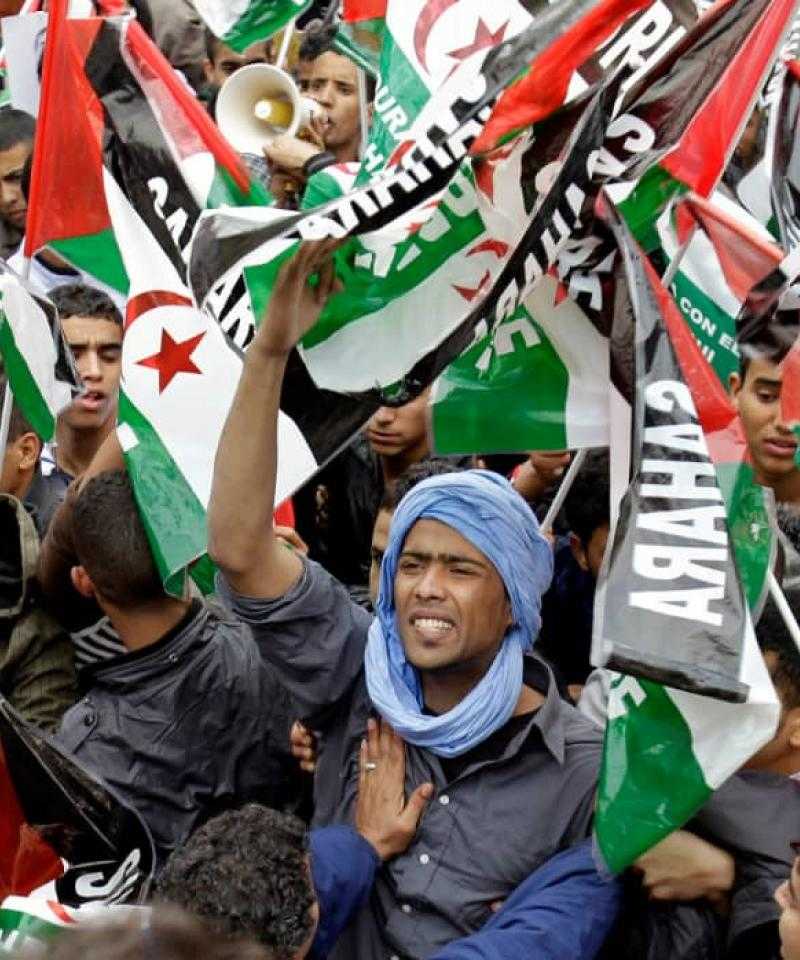Country profile: Western Sahara

For The Broken Rifle 111 we are introducing a new feature - a country profile focusing on the history, militarisation and resistance in a specific country. Our first article is on Western Sahara. We hope you enjoy this new feature! If you would like to contribute, please write to info@wri-irg.org
Western Sahara is located in the north west of the African continent. It is bordered with Morocco from the north, Mauritania from the south and east, Algeria from the east, and the Atlantic ocean from the west. Western Sahara has a population of just over 500,000.
Western Sahara was a Spanish colony from 1884 until 1976, holding a strategic location on the Atlantic coast. During the period of Spanish colonialism there were several resistance campaigns led by the Sahrawi people, some of them peaceful. These inlude the 1969 "Vanguard Movement" led by the leader Mohamed Sidi Brahim Bassiri. Bassiri organised a clandestine group called the Harakat Tahrir, which planned a petition to the Spanish governor demanding liberation of Western Sahara of the colonialism. On 17th June 1970 the group organised a big demonstration which became known as the "Zemla Uprising". The protest demanded independence and was violently broken up by Spanish Foreign Legion, who opened fire and killed at least eleven people, and kidnapped and imprisoned Bassiri. His fate remains unknown. There has also been armed resistance campaigns, such as the" national military of liberation" in the mid-50s, and the "Khanga battle" led by the Polisario Front, on 20th May 1973. The Polisario Front is an armed Sahrawi rebel national liberation movement aiming to end Moroccan presence in the Western Sahara.
On 31 October 1975, Morocco invaded Western Sahara with Spanish consent. On 6th November 1975 Morocco began a major settlement process, organising a big march of more than 350,000 Moroccan citizens to occupy Western Sahara in a campaign called “the Green March”. On 14th November of the same year, Spain signed the "Madrid Convention" with Morocco and Mauritania. According to the convention, Western Sahara was divided between Morocco and Mauritania, leading to a new era of colonisation of the region.
On 26th February 1976 the last Spanish soldier left Western Sahara, and the following day was marked with the establishment of Saharawi Arabic Democratic Republic (SADR) by the "Polisario front". The SADR is a state claiming the whole of the Western Sahara as its territory, but in fact controls the easternmost one-fifth along the border with Mauritania, a very barren desert region.
There were a lot of wars between Western Sahara and Morocco, and between Western Sahara and Mauritania. In in 1979 Mauritania withdrew its troops and relinquished control of Western Sahara, but Morocco continue to occupy around 75% of Western Sahara today. Morocco divided Western Sahara by building a 2700 km long wall (or “berm”, made out of sand), and has used more than 7 millions of landmines to militarise the area. The SADR govern the region between the wall and the border with Mauritania.
The war between the SADR and Morocco continued until September 1991 when the United Nations organised a “Peace Convention” and ceasefire. According to the convention the United Nations promised to hold a referendum of the Saharawi people, but this has not happened yet for a variety of reasons, primarily because it is blocked by Morocco. The peace convention means that the SADR pursue Western Sahara's independence through peaceful means, but there are a lot of violations of human rights of Saharaui people by Morocco and the area remains highly militarised.
Non-violence Group in Western Sahara
NOVA stands for The Non-violence Group in Western Sahara. NOVA is a volunteer activist group in the Saharawi civil society and was established on 17th June 2012. NOVA believes in the principle of non-violence and works to promote and spread the culture of non-violence, and to solve conflicts peacefully. The group is composed of committees committed to accomplishing the group programs The various committees include administration, committee of dialogue, committee of media and the committee of activities. The membership is open to every Saharawi volunteer who believes in non-violence and respects the conditions of membership. The new participants begin their work after taking training in non- violence. NOVA activities include:
- organising inter-generational dialogues,
- organising dialogue between citizens and politicians,
- organising a dialogue about the role of women in peace building to highlight the U.N resolution 1325 about women, peace and security,
- dialogues about the peaceful resistance and non-violence strategies,
- dialogue about school dropout with teachers, parents to explore the reasons young people have left school,
- campaigns for consumer protections,
- human rights and non violence trainings for young people,
- participation in International and Magarebien forums to empower the Saharawi civil society,
- participation in dialogues between Saharaui, Algerian, Tunisian and Morrocan young people according to 2250 Resolution.
The campaign for independence for Western Sahara - the last African colony – is in dire need of international solidarity, support and global aid to enable its people their legal right to self-determination and freedom. Solidarity can come in many forms, including protesting outside Moroccan embassies and the embassies of the countries who contribute in the peterpetuation of this occupation, joining media campaigns that call for our freedom, and condemning this colonialism.
Stay up to date with our international antimilitarist activism.